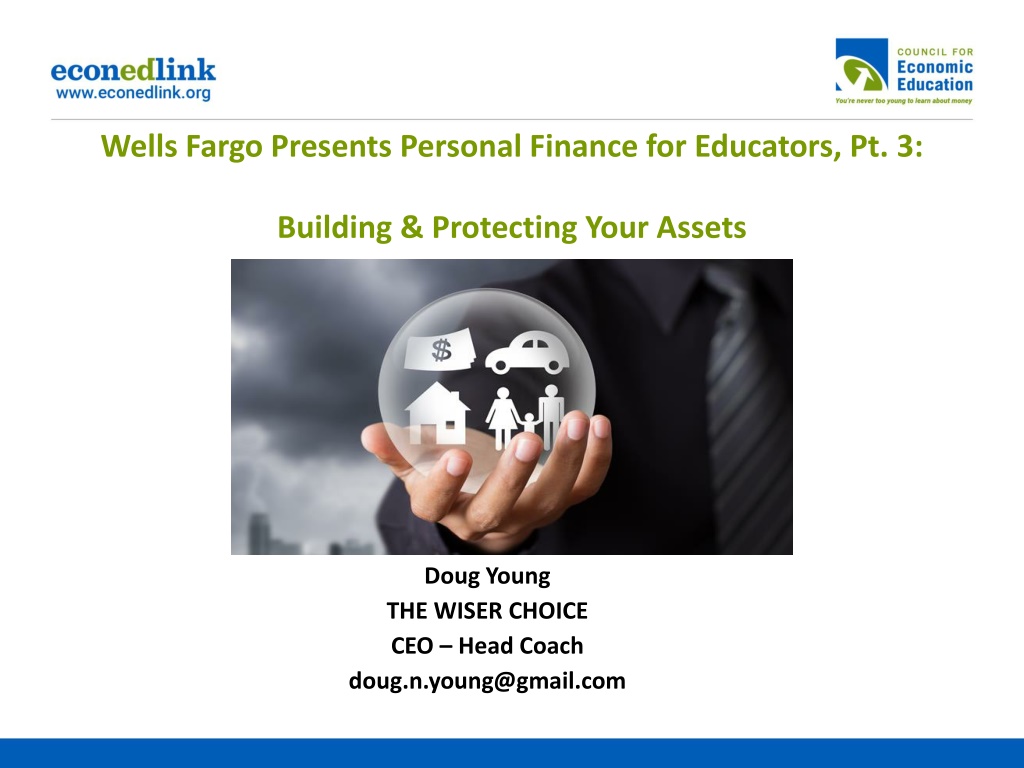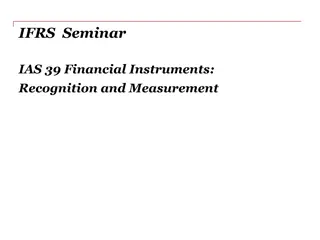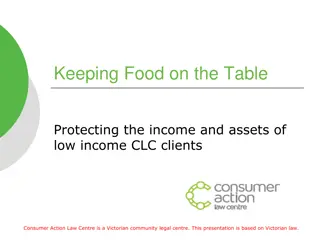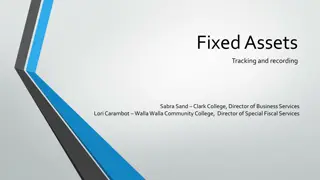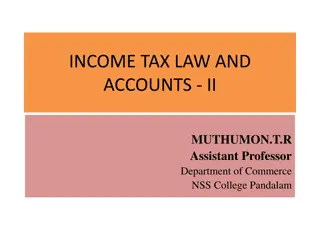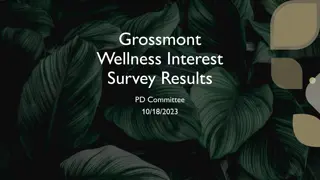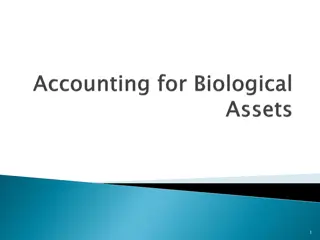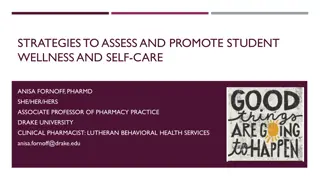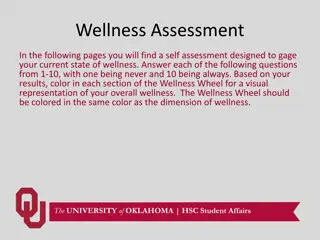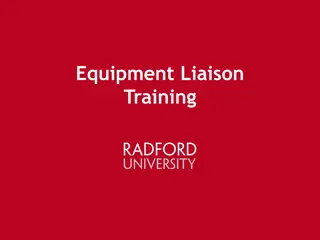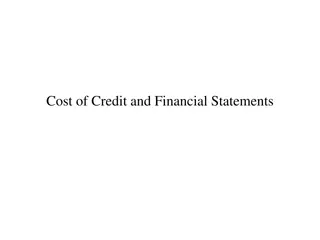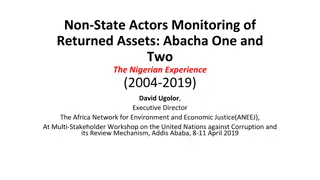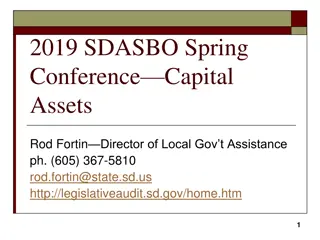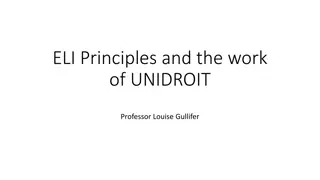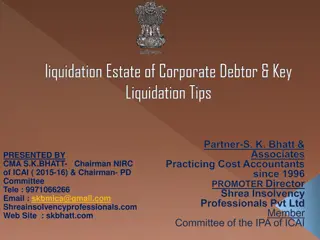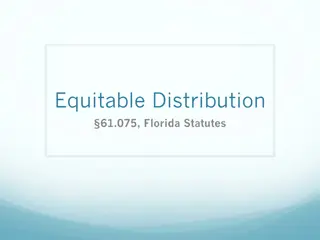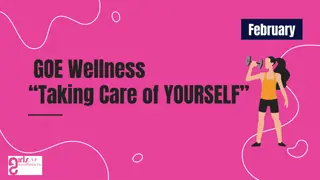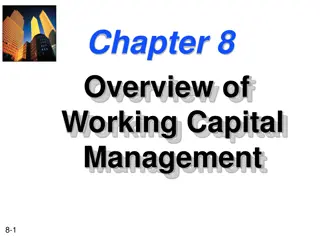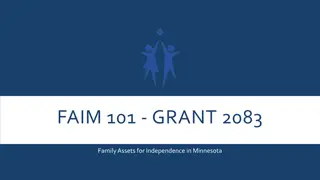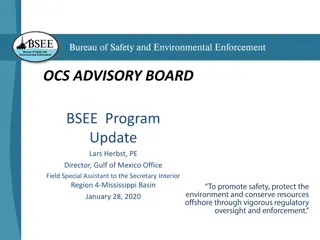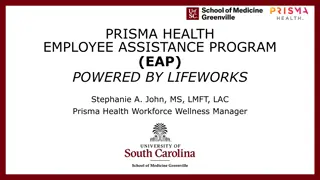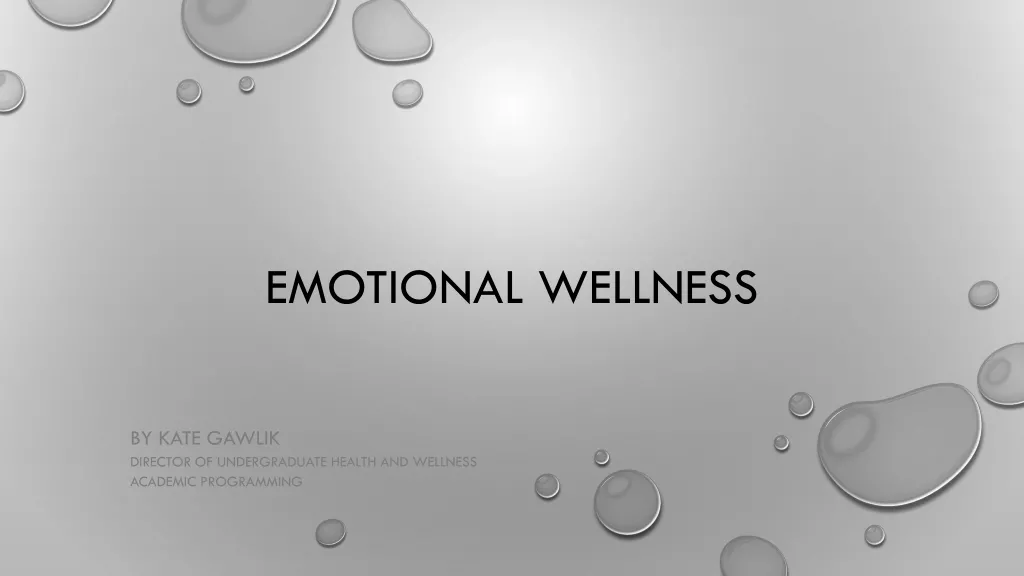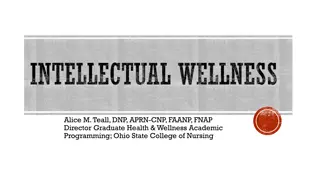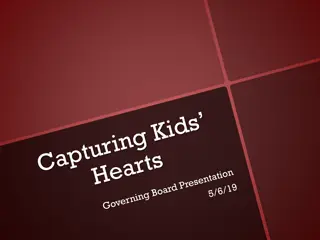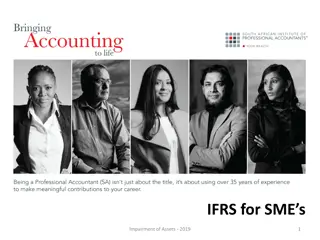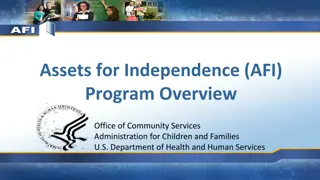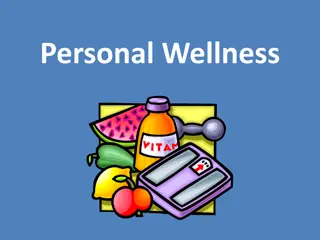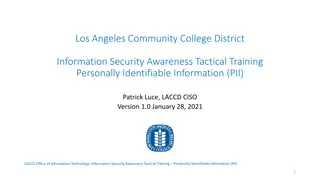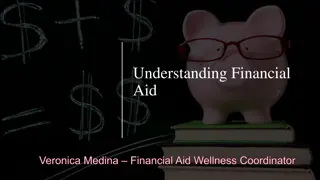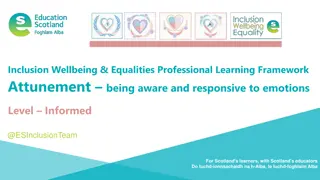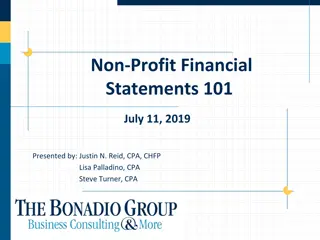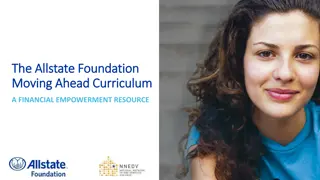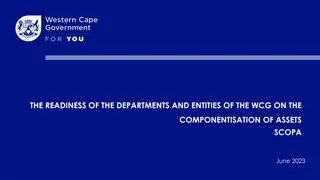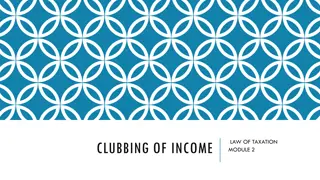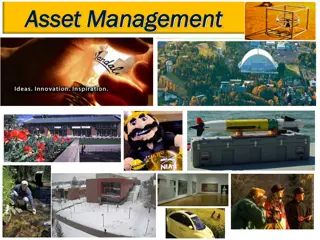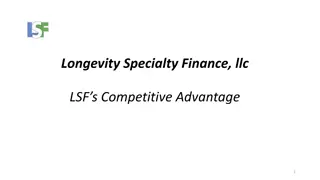Building and Protecting Your Assets: Financial Wellness Strategies for Educators
In this resource, Doug Young from THE WISER CHOICE presents essential insights on financial decision-making, emergency fund preparation, wealth-building strategies, retirement planning, and overcoming financial obstacles. Discover key statistics highlighting financial concerns, unexpected challenges, and practical steps to enhance financial well-being. Access professional development webinars on EconEdLink for in-depth learning and certification.
Download Presentation

Please find below an Image/Link to download the presentation.
The content on the website is provided AS IS for your information and personal use only. It may not be sold, licensed, or shared on other websites without obtaining consent from the author. Download presentation by click this link. If you encounter any issues during the download, it is possible that the publisher has removed the file from their server.
E N D
Presentation Transcript
Wells Fargo Presents Personal Finance for Educators, Pt. 3: Building & Protecting Your Assets Doug Young THE WISER CHOICE CEO Head Coach doug.n.young@gmail.com
EconEdLink Membership You can now access CEE s professional development webinars directly on EconEdLink.org! To receive these new professional development benefits, become an EconEdLink member. As a member, you will now be able to: Automatically receive a professional development certificate via e-mail within 24 hours after viewing any webinar for a minimum of 45 minutes Register for upcoming webinars with a simple one-click process Easily download presentations, lesson plan materials, and activities for each webinar Search and view all webinars at your convenience Save webinars to your EconEdLink dashboard for easy access to the event You may access our new Professional Development page here
Professional Development Certificate To earn your professional development certificate for this webinar, you must: Watch a minimum of 45-minutes and you will automatically receive a professional development certificate via e-mail within 24 hours. Accessing resources: You can now easily download presentations, lesson plan materials, and activities for each webinar from EconEdLink.org/professional-development/
Objectives Analyze and make financial decisions based on risk and return. Prepare a plan for dealing with potential emergencies which can debilitate your dreams. Understand the risks of not having an emergency fund. List ideas on how to increase your savings. Learn that to build wealth one must have internal and external goals for achieve them. Anticipate roadblocks to overcome that can limit your asset building. Understand that financial freedom should lead to personal freedom in retirement. Treat your wealth building like a business you own! Improve your financial situation by networking and using other people s resources and connections.
49% of retirees are concerned about running out of money, 64% will retire broke. 55% of adults had less than $10,000 in savings Re-budget and try not to borrow as you get older. Don t be borrowing using plastic, insurance policies, retirement funds, etc. Lack of emergency funds, inflation and change in family s income drain reserves. Sickness to a family member (parents, child, partner) can financially break you. Divorce rate was 34% higher from March through June (2020) compared to 2019. Other unexpected problems: Lockdown Stress Unemployment Homeschooling Children Mental Illnesses
FINANCIAL WELL-BEING SCALE This statement describes me: 1. I could handle a major unexpected expense. 4 Completely Very well Somewhat Very little Not at all 3 2 1 0 2. I am securing my financial future. 4 3 2 1 0 3. Because of my money situation, I feel like I will never have the things I want in life. 3 2 1 0 4 4. I can enjoy life because of the way I m managing my money. 4 3 2 1 0 5. I am just getting by financially. 4 3 2 1 0 6. I am concerned that the money I have or will save won t last. 4 3 2 1 0
This statement describes me: Completely Very well Somewhat Very little Not at all 7. Giving a gift for a wedding, birthday or other occasion would put a strain on my finances for the month. 4 3 2 1 0 8. I have money left over at the end of the month. 4 3 2 1 0 9. I am behind on my finances. 4 3 2 1 0 10. My finances control my life. 4 3 2 1 0 Add up your total score: __________
CFPB FINANCIAL WELL-BEING SCALE https://files.consumerfinance.gov/f/documents/bcfp_fin-well-being_full-scorecard.pdf
Start an emergency fund - Set aside 6-12 months of savings. Be sure to start paying back any student loans. Penalties are severe (garnished wages, higher interest rates on loans, etc.) The average monthly student loan payment for a 20 year old was $400. Review your credit report and avoid increasing card debt. www.annualreditreport.com (1 free report from each Bureau). Bad credit issues remain on your credit report for seven years. Employers may check your credit report before hiring. Invest in your future. Take advantage of 401k s, 403b s or similar plans. Recommend saving @15% of your pre-tax income for retirement. $19,500 for those under age 50. Exercise regularly on own or join a gym. Keep health and insurances up to date as 1 illness/accident can bankrupt you. Protect your other assets (403b, Roth IRA, etc.).
Buy a house/coop/condo/townhouse, if desired. Have enough insurance to protect you/your family (health, home, car, etc.) Have the equivalent of your annual salary saved as a nest egg, twice your salary at age 35, and three times your salary by the time you exit your 30s. Put aside 18% of your salary a year, at age 35. Should try to save 23% a year. If you have children, start an investment account (529 Plan) early. Build, diversify and use asset allocation based on age and years of work left. Boost your job skills or train for another possible profession for later in life. Prepare to work somewhere until age 70. Keep healthy with either a gym membership or exercising regularly. Review your credit report.
Get a fee only financial advisor and do a background check on that person. Most Americans are behind at this point, with an estimated savings of only $63K. Max out retirement savings and re-balance your retirement account regularly. Make a personal retirement plan projection Start at Employee Benefit Research Institute - www.ebri.org Many mutual fund companies also provide sites for future planning. Check all insurance policies and coverages protecting all your assets. Know the difference between term, whole-life and universal life. Make sure you have enough and not too much. Even with a pension, set up a self-employment retirement plan (Roth IRA, etc.) If you have a business with no retirement plan, start your own account. Don t rely on others for your retirement, start now.
Ramp up 403b contributions to $19,500 for those under 50 and $25,500 for those over 50. Discuss with State Union Rep. retirement options (spouses options, pop-ups, full sum, etc.) Review your Social Security options, check history and get earnings estimate. When do you pay down debts?: College loans, mortgages, credit cards Pay off bad debt first. Start with the highest interest rate credit cards. Car and student loans should follow. Want to start collecting (8% growth each year to defer to age 70). Start planning your next act for post-retirement: Becoming an entrepreneur of some kind what would be the start up costs? Are you planning on working after retiring? Start preparing! Do you both agree on when to stop working and where will you live? Downsize the house, purge the attic, close that storage unit. Pay off all debt except that low interest mortgage. Protect the wealth you have. Review all insurance, annuity and pension plans. If you want more insurance, premiums get them ASAP, if healthy. Check with your Union for insurance policy options to age 95.
Get a grip on your retirement income sources. You will need 6-10 times your annual salary for retirement (love that pension). Review anticipated incomes (savings, Social Security, pension(s), distributions, etc.) Plan a weekly, monthly and yearly budget at least a year before you stop working. Pay off all debt (mortgage, HELOC, credit card, etc.) Keep contributing to retirement funds, work OT, night classes, summer school, etc. Will you pay state tax on your pension where you live now, or plan to move? Consider working beyond official retirement age. The longer you work the more you can contribute to a retirement plan. Your social security benefits will increase up to age 70. Shift your investments to a more conservative asset mix. Cut back on stocks and increase bonds and savings. Don t drop out of the investment market, as you need an inflation fighter. Plan your withdrawals: At 70 you must tap 401(K) savings. (Required Minimum Distribution) Be conservative with spending and withdrawals, as people exhaust their funds too fast. Even those on a pension find they are spending too fast and depleting reserves.
On average, you will live 7 years longer than a man. Women will need income for an extended retirement.
They will need more income for an extended retirement. Men have a median retirement savings balance of $76,000, women just $23,000. Social Security income and availability is the number one concern.
Women are 3x more likely to report they cant afford to save for retirement. Women list increased feelings of anxiety, stress, social withdrawal, negative impact on family relationships including kids and/or significant others. Women (43%) fret more about finances, and retirement more than men (65%). Women are more likely to take career breaks than men. Provide care for older loved ones in need or death of one. Not collecting a salary for a number of years (childcare or own illness). Not contributing to a retirement plan thereby increasing that savings gap. After divorce or death of husband many women are intimidated by: Financial planner who is usually chosen by the husband. Not totally aware or confused about financial picture. Insurances: What do they need, have enough or the right type?
With COVID-19 continuing to spike 12 million plus are unemployed. Many schools and child-care centers still are not open. Women are bearing the brunt by quitting jobs and home-schooling. Aug. to Sept. 856,000 women compared to 216,000 men lost jobs. 1 in 4 women consider leaving the work force or downshifting. There s no historical pattern for what s happening to women. Women centered jobs (health care, education, food, hospitality) cut. 70% of workers in these occupations are women. Financial impact: Loss of wages, discretionary income. Inability to build a financial future. Even greater stress for single separated or divorced women Economic impact: GDP will decrease as the cost of labor will increase.
Most seniors 65+ enrolled in Medicare worry about ability to afford health care. 32% of seniors say they've had a surprise medical bill over the past 2 years. Most fear a major personal health crisis could lead to serious debt or even bankruptcy. 24% of older Americans say they'd need to use a credit card to pay for a severe illness. Meanwhile, 32% say they'd tap their retirement savings to cover that cost. HSA s are the best way to cover future health care costs. An HSA actually offers more tax benefits than an IRA or a 401(k). Your contributions go in tax-free, growth is tax-free and the withdrawals are tax- free. However, they must be used to cover qualified medical expenses.
Contribute at age 30 and withdraw money yearly as needed for near-term medical expenses. Any money you don't use can be invested and withdrawn later on. It pays to overfund your HSA yearly, so you have the option of carrying funds until you retire. HSA age 30 could spare you from debt, bankruptcy or an expensive hospital stay. Sadly, many retirees today don't have one of these accounts at their disposal. Take advantage of the HSA by contributing the maximum amount allowed. For the year 2021: You can contribute up to $3,600 for individual coverage and up to $7,200 for family. If you're 55 or over, you can contribute an extra $1,000 to whichever limit applies to you.
Health, auto and homeowners insurances are a given. Consider these policies given you and your family s needs. Life Insurances o Term o Whole o Universal Life Liability Umbrella Long-Term Disability Long-Term Care Renters
LONG TERM DISABILITY LONG -TERM CARE LIABILITY UMBRELLA LIFE RENTER'S Purpose of Coverage Preserve Income for Emergency Preserve Income for Emergency Leave Money for Survivors Protect Your Possessions Protect Your Possessions Money to cover nursing, at-home or other types of care. Compensation for property loss and/or living costs.. Money for legal fees and a court settlement , if sued. About 60% until person reaches age 65. Lump sum upon the insured person's death. What it Pays. Those relying on another's income, has debt or leaving money to survivors. Avoiding risking spending assets on later-life care. Renters in an their own apartment or other rental. Protecting assets beyond home and auto liability limits. Someone who depends on earned income. Who Needs It? Through your employer or professional association. Some employers offer group coverage or an independent agent. Some employers offer it or through an agent or online.. Through an agent or onsite company (Quote Wizard). Insurers whom offer both auto and home. How To Buy IT. For a $500,000 term policy a Non-smoking 55 year old cost would be $150 per month. $15 - $30 a month depending on where you live and value of your possessions. Nothing when employers offer it or for 1-3% of your salary. For healthy 55 year old: Male @$1,700 , female @$2,675. A $1 million policy costs $150-$300 per year. Costs? "Replacement coverage" covers the cost of new items. "Cash value" pays current, depreciated value. Usually need a $250,000 liability insurance on auto and $300,000 liability on home. Annual premiums can rise quickly as years pass. Coverage can be cost prohibitive. Price out different amounts of coverage as well as different companies. Benefits are based just on salary, not bonuses or commissions. Beware! Law suits: Dog bites neighbor, drunk-driving incident, someone trips over a hose and falls down steps. Ave. claim is for 31.6 mos. Five costliest jobs to insure: Roofers, Truck Driver, Coal Miner. About 70% of people who reach age 65 will spend 2+ years in a nursing home. Ave. premium increases by 2% between ages 25- 30, jumps 93% between ages 60-65. Coverage usually insures theft, fire and plumbing leaks and some premise losses. Surprises!
Make sure you have a copy of your policy and files with account numbers and other details. Move Promptly. Claims have deadlines for filing, so know yours. Renters policies typically give 48-72 hours after an incident to file. Long-term care and disability policies have gap periods for payments and benefits. Inventory everything in your house and have lists, pictures and/or receipts. Need proof if you have replacement coverage versus a cash value coverage. When talking to an Agent or Adjustor, don t give up when you hear No. Be persistent and polite as Insurance companies don t like paying claims. They must give you a clear explanation for their refusal. Send a copy of claim to Agency supervisor. Request for a response in 10-15 days. If filing a substantial claim, hire a Personal Insurance Adjustor who fights for you. If no satisfaction contact your State Insurance Board. Still No Response? Seek a lawyer whose forte is insurance coverage and claim litigation.
Planning as the Pandemic Rages How Do I Survive This Tragedy, Financially?
Reset, Rethink & Repair Your Finances In one month, the unemployment rate for people 55+ quadrupled. It hit a rate nearly double the Great Depression. 2021 may be worse! Jump in mortgage delinquencies was the steepest ever recorded. Drop in consumer spending was the largest in modern times. After 9 months of the coronavirus, is your money situation acceptable ? Let s do a check for a possible reset looking at four key areas. o Cash Flow o Housing o Retirement o Priorities
Five signs you might be struggling: o You re using 1 credit card to pay off another or are only paying minimums. o Your rainy day fund is shrinking and your savings account balance dropping. o You ve started getting collection notices and past-due bills. o You're delaying home improvements, doctor appointments and car repairs. o You dread getting the mail and you won t pick up phone call,s fearing creditors or collectors are after you. 10 Minute Checkup: o Pull out bills from last April, when the lockdown hit, to compare to this month s bills. o Look to cut back spending and assess your wants versus needs. o Look at recurring charges including memberships, subscriptions, etc. o Re-do your budget, attack debt and build a bigger financial cushion.
What are the signs I can longer afford my mortgage? o Does your monthly payment exceed 28% of your gross income? o What s your debt- to- income ratio? It should be between 28-36%. o Can you cover all utilities and other fees? o Do you have an emergency fund for unexpected costs? Would now be a good time to downsize? o Are you empty-nesters and have a lot of living space? o Check the housing market in your area and your home s equity . o Mortgage rates are low and should remain low for awhile. o Can you find a lower-cost living area near which can save you money? o Would you consider moving to a new, lower-tax and cheaper location? o Widowed, divorced, single? Any interest in shared housing?
Should I delay retirement, or start it sooner? o How many people do I interface with daily that might threaten my health? o Do you have enough retirement income to meet basic living needs? o Do you have realistic expectations to work part-time or a new career? o Can you afford health insurance as a retiree or need more coverage? o Do you enjoy your work, the stimulation or social engagement? o Are there things pulling you towards retirement? o How healthy are you and your spouse/partner? Is it too late to start saving or increase saving for retirement? What should I do about Social Security? o Will Congress cut my benefits? o If unable to work, have you applied for disability benefits at age 62? o If I wait to collect Social Security, will I live long enough to enjoy it?
How do I prepare for the next crisis? o Have cash available (8-12 months costs). o After completing steps 1-3, set new goals going forward. o Get a Savings Buddy or have a long discussion with your CFO! Does COVID-19 change what I owe my kids and other people? o Have you already gifted them? How much will you give them? o List your real goals for the rest for your life (bucket list, grandkids, etc.) o Are you sure you have extra money to share? o Decide what you can do without. - Reset Your Finances, AARP Bulletin, November, 2020. -Chatzky, Jean. Does COVID-19. . .People , AARP Bulletin, November, 2020.
Doug Young doug.n.young@gmail.com The WISER Choice
CEE Affiliates https://www.councilforeconed.org/resources/local-affiliates/
